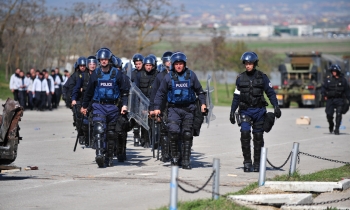Pushed into a tight corner by the international outcry over the crackdown on its critics, the Ethiopian government has now begun targeting foreign journalists. On Saturday last, the country's Ministry of Information ordered a British journalist to leave the country for tarnishing its image worldwide.

The Ethiopian News Agency (ENA) quoted the Press License and Control Department of the ministry saying that Anthony Mitchell was being expelled for disseminating information about Ethiopia that was far from the truth. It said though he had been advised repeatedly and also reprimanded for his misbehaviour, Mitchell continued to disseminate information bent on tarnishing the image of the country.
Mitchell, who works for both the Associated Press (AP) and the UN humanitarian news agency Integrated Regional Information Network (IRIN), had since landed in Kenya.
The AP and Western diplomats attempted to contact the minister of information with no success on Saturday or Sunday. The ministry's offices were closed on Saturday and Sunday, but the minister usually is reachable on his cellphone. Seyoum Mesfin, Ethiopia's foreign minister, did not show up for an appointment with an AP reporter on the sidelines of an African Union summit in Khartoum, Sudan, on Sunday.
The announcement of the expulsion coincided with a visit to Addis Ababa of the top US diplomat for Africa, Jendayi Frazer, who is mediating in the border dispute between Ethiopia and Eritrea. Frazer met Ethiopian Prime Minister Meles Zenawi earlier on Saturday, state television reported.
"Mitchell complied with the government's order to leave the country today, but we hope he will be allowed to return to Addis Ababa soon so that he can be with his family and return to his duties," said Mike Silverman, AP Managing Editor. "The AP stands behind Mitchell, who is an aggressive and fair journalist and has worked in Ethiopia for the AP for more than five years."
"Mitchell is a respected and experienced reporter, and he should not be expelled for doing his job," said Committee to Protect Journalists (CPJ) Executive Director Ann Cooper. "The Ethiopian government, which has imprisoned 16 journalists since November, is demonstrating yet again it is bent on silencing independent reporting."

The Ethiopian government in the last few months has been cracking down on the press. Independent journalists and editors were among 131 people arrested in November and December and charged with treason, genocide, and other offences. Five Ethiopian radio journalists for Voice of America living in Washington also were charged in absentia in the same case.
According to Human Rights Watch (HRW), since the May 15 parliamentary elections in which opposition parties made massive gains in their share of seats, the Ethiopian People's Revolutionary Democratic Front (EPRDF) government led by Prime Minister Meles Zenawi has used repression, intimidation and violence to punish real or perceived opposition supporters and eliminate dissent in both urban centers and rural areas.
In June and again in November, demonstrations by opposition supporters in Addis Ababa were met with lethal force from the government. In June alone, more than 30 people were killed and more than 100 injured in Addis Ababa when security forces fired upon demonstrators, who, in some cases, were throwing stones and blocking roads.
On November 1-3, 46 protestors and seven policemen died in Addis Ababa. Following each episode of violence, the government arrested thousands of people in Addis Ababa and many other cities as part of a national crackdown. While most of the June detainees have reportedly been released, thousands of people arrested in November and afterwards remain in detention.
Many supporters of the opposition Coalition for Unity and Democracy (CUD) and other opposition parties were arbitrarily detained without charges, and editors of five newspapers were arrested (and later released on bail), apparently for their coverage of the post-election violence. On December 21, the government charged 131 persons — including prominent CUD politicians Hailu Shawel, Mesfin Woldemariam and the newly elected CUD mayor of Addis Ababa, Berhanu Nega — with charges including treason, inciting violence and planning to commit genocide. Several civil society activists and journalists were included in the group.

The crackdown evoked stringent criticism from the international community. Britain has decided to withhold direct budget support worth around 50 million pounds sterling (US $88 million) to the Ethiopian government over political unrest that followed disputed elections in May 2005, IRIN reported.
"The UK is seriously concerned about governance, human rights and the detention of and serious charges faced by opposition, media and members of civil society," Hillary Benn, Britain's international development secretary, said on January 18. "Because of our concerns over the political situation, I have told the Prime Minister that we cannot provide direct budget support under the current circumstances," he added. Britain also provides some 40 million pounds ($71 million) in support to various humanitarian organisations, including UN agencies, working in the country.
"The Ethiopian government is violently suppressing any form of protest and punishing suspected opposition supporters," said Peter Takirambudde, director of HRW's Africa Division. "Donor governments should insist on an independent, credible investigation into abuses by federal police and local officials in rural as well as urban areas."









